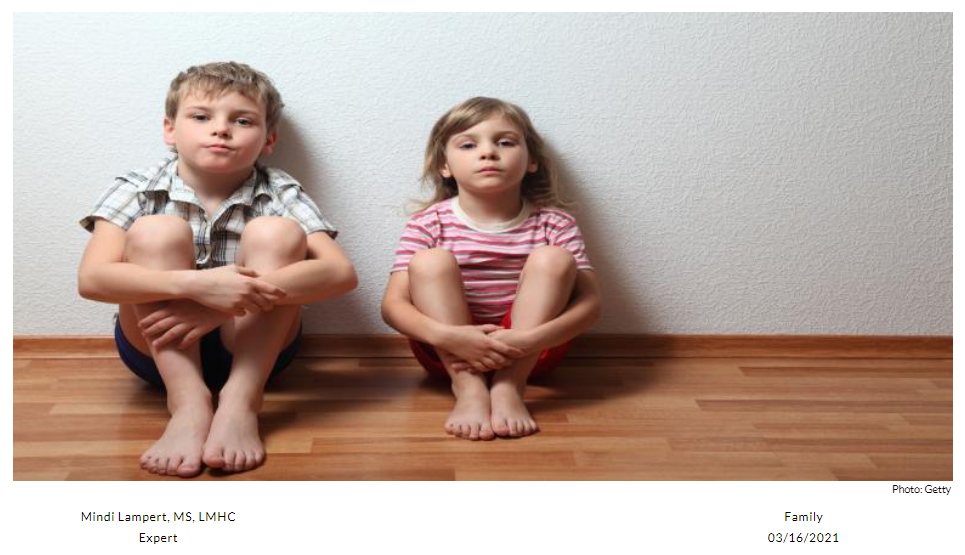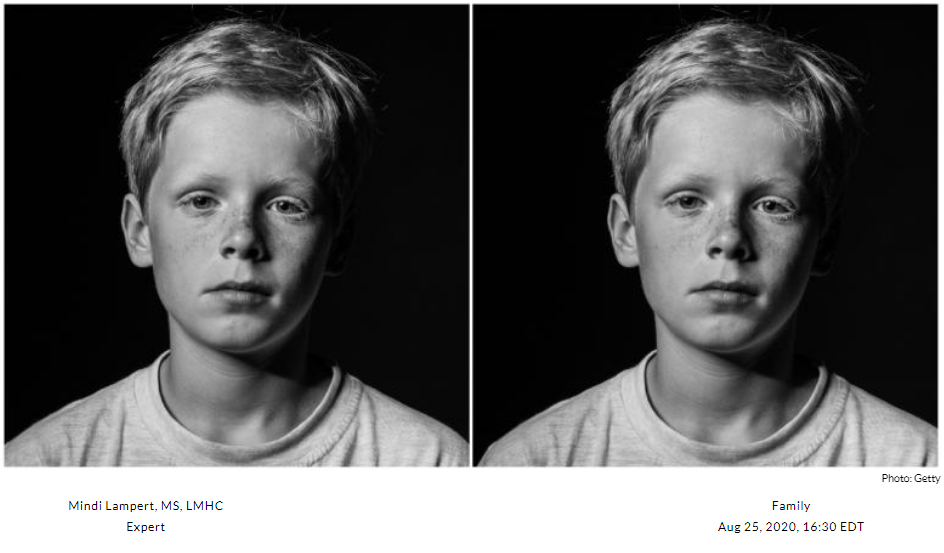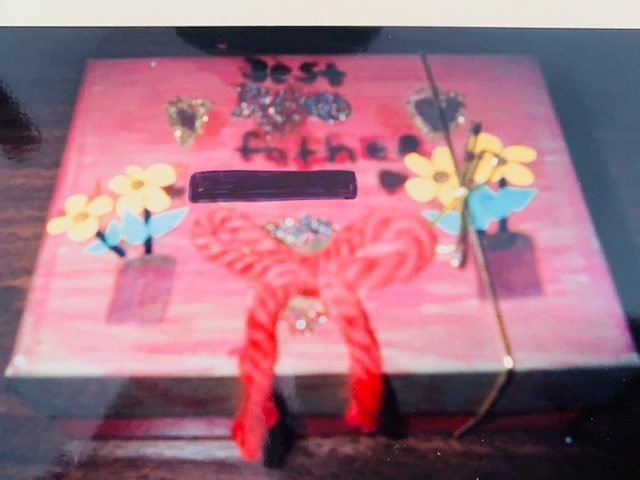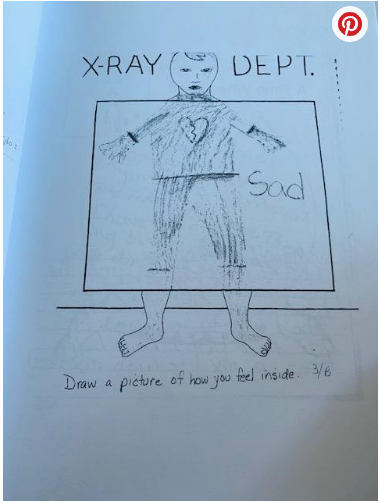My Articles/My Practice
New Articles
Put Your Kids First: 8 Guidelines For Parents Navigating Divorce & Separation

No child wants their parents to divorce. I’ve found this fact to be very true after counseling school-aged children of divorce for more than 20 years.
Separation and divorce bring about confusion and misunderstanding for many children because parents feel that it’s better to spare them the truth of what’s happening in the family. However, children need to be included in the discussions of the changes that are about to occur. At their developmental level, the situation will simplify itself as time goes on.
Pretending that nothing is going to change is simply not true and will not benefit your child.
Respect your children’s emotional health during your divorce.
Children I’ve counseled shared their feelings from when their families were going through a separation or divorce, either in person or in written notes.
I will only share if the sentiment is from a boy or a girl and what grade they were in at that time.
Some of it will touch your heart like it did mine. Some of it will make you feel their sadness the same way I felt it. It was very difficult not to cry with them for the pain they were experiencing.
But, at the same time, I was happy that they were sharing their real thoughts and felt comfortable enough with me to disclose their truth.
It’s much better for their emotional health to not keep their feelings only in their heart without talking about them. This, I also know for sure, to be true.
Here are 8 guidelines for parents who are navigating separation and divorce, per their kids’ feelings.
1. Don’t be disrespectful or fight with your ex in your kids’ presence.
When children hear their parents fighting or being mean and disrespectful to each other, it affects them greatly. They internalize those feelings but often keep them to themselves.
Many children have expressed their sadness to me about hearing the fights and words their parents have exchanged. They know that their parents are sad and often crying.
They feel it best not to share with their parents how they feel or that they’ve heard what was going on, for fear of making them sadder.
So, when they disclose their true feelings to me, I feel great relief for them.
2. Explain that moms and dads sometimes need a “time out” from each other.
One third-grade girl told me, “My dad left me, my mom, and my sister. I can’t forget about it. When I’m with my dad and he drops me off, I’m always crying.”
When children tell me that their parents were fighting and that one of them left the house, I often tell them that sometimes, parents take a “time out” from each other. That doesn’t always mean divorce.
I felt it was a level they could relate to that would also bring them hope.
One fourth-grade girl said, “My parents’ time out has been forever and I’m really worried.”
One third-grade girl wrote me a note asking to see me because “my parents are in a divorce and I can’t stand it without my dad.”
3. Allow your children to feel their sadness.
One third-grade girl said, “I need to see you because my mom and dad are getting a divorce and I am so sad, so very sad.”
It’s very common for children not to express their own sadness of the divorce with their parents because they don’t want to make your sadness any harder for you. It’s also common for them to feel protective of their parents.
One helpful thing to say to your child would be to let them know that it’s sad for all of you, and it’s OK for them to share their feelings, too. Reassure them it won’t make you feel worse or sadder.
4. Don’t keep the situation a secret from your children.
One fifth-grade girl told me, “My parents were going to get a divorce but then they didn’t — but I still can’t get it out of my mind.”
Children can process more than some parents think they can. It’s better for the child to have more of an understanding of the situation. This way, they will feel less confused about the truth.
Parents should be talking with their children about the family situation in order to avoid more confusion than necessary. Your kids know that something is happening.
A fourth-grade girl wrote me a note saying, “I want to talk about my parents getting a divorce because they don’t understand each other.”
By speaking and explaining more to your child, at their level of understanding, it will be truly better for them.
Children often have a profound understanding of what is going on in the family. I’m often amazed at their deep understanding.
5. Ensure that your children feel safe.
A fourth-grade boy told me, “My stepdad left my mom, me, and my brother. My mom is so sad, and we’re about to lose the house.”
This is a heavily weighted thing for a parent to worry about, let alone an eight-year-old child.
To help your child feel safer, it’s much better to try to help the child understand that no matter what happens, you will all be OK and safe. It will just be different.
6. Clarify certain actions with your children.
One fourth-grade girl told me, “My dad is separated from my mom and he gave my mom an insult.”
This might mean verbal or physical abuse, but it’s best to ask children to explain what they meant by “insult” or other similar wording.
Some children regard “insult” as hitting or pushing the other parent. Some regard it as speaking disrespectfully to the other parent. It’s best to ask them directly what they mean.
Miscommunication is one of the major problems in marriage and relationships, so more clarity is needed from the child to find out what certain words mean to them.
7. Do not alienate your children from the other parent.
Unless a parent is abusive, negligent, or otherwise unsafe and unfit, do not alienate your kids from the other parent.
A third-grade boy told me, “My dad does not let me see my mom very often. She just came out of the hospital and I always miss my mom.”
This is not punishing the mother but the child. If you want to do what’s best for a child, you must find a healthy balance between your ego and a child’s best interest.
If parents really want a healthy separation or divorce, it’s possible. However, the child’s needs must be met by a show of respect and consistency from both parents — a united front.
8. Never put your kids in the middle.
A fifth-grade girl told me, “My problem is how my family is breaking apart.”
A fourth-grade boy talked about how, “My mom and dad don’t like passing things person to person, they make me pass things on to them just because they don’t want to see each other.”
Children hate to be put in the middle. It’s a very unfair practice and certainly not in the best interest of the child.
They especially find it difficult to deal with parents asking them to go to court to say who they want to live with.
A fourth-grade girl told me, “My parents are making me go to court because they want me to say who I want to be with more.” I have heard this from many children and they all find it extremely distressing and hurtful.
Protect your children’s emotional well-being through your divorce.
These steps and guidelines are meant to increase your chances that with the family all working together, there will be a better outcome for a very difficult time and situation, especially for your children.
If done with the child’s best interests at heart, then separation or divorce can absolutely be managed successfully.
Originally published on YourTango.com
https://www.yourtango.com/experts/mindi-lampert/guidelines-parents-navigating-divorce-separation
How To Help Children Cope With Death And Grief

Experiencing grief is a heartbreaking moment in every person’s life. When someone you love is sick and may die, there are many different feelings. You may not get a chance to say goodbye. This is very difficult and confusing for adults, but grief in children is even more so. In fact, explaining death to a child for the first time can leave parents stumped and confused. In my experience, it has been very comforting when counseling children to help them express what the person who is ill or has died means to them and give them the opportunity to say goodbye when possible. This helps them work through their grief.
Here are 4 tools parents can use to help children express their feelings of grief, look back on their memories with the person they lost, and finally say goodbye.
1. Let them talk about their feelings of grief.
These feelings will usually include great sadness. It may bring feelings of shock and numbness or disbelief when they hear about their death. When the shock wears off, reality sets in. Then, the truth will become real. It’s common in these times of the COVID-19 coronavirus pandemic to feel angry due to not being able to be with your loved one at the time of their death in the hospital. Ask them to express to you how they feel about the person who may die. Maybe share with you something the child felt that gave them a special bond. I remember an eight-year-old girl telling me about her mother’s kindness, that she can still hear her mother’s soft voice. Her father told her that her mother would always be in her heart, and she found this comforting. I remember a nine-year-old boy telling me very poetically that after his father died. Every time he looked at the sky, he got tears in his eyes because he knew his father was in heaven. Sometimes, children blame themselves for their loved one’s death. They feel that if they were with them, they could have saved them or stopped their death.
2. Ask your child to write a letter to the person who died.
They should address it to them. “Dear mom…” “Dear dad…” “Dear grandma…” For some children, maybe it’s easier to write their feelings down and express what that person meant to them, instead of talking. They can write about something special they shared or an experience they had together. They could also draw a picture, if it’s more age-appropriate. I remember counseling with a nine-year-old girl who wrote a letter to her mom. She expressed sadness that her mother is not there with her, anger because her mom was the one that made her feel the happiest, and longing and wishing that her mother was still with her. In another letter written by a 10-year-old girl to a grandparent, she tells them that she loves them, that she’s getting good grades, and that she’s in the fifth grade now. She also says that she and her family feel sad. She draws hearts all over the letter.
3. Ask your child to draw a self-portrait.
I’ve found this to be a favored exercise. They must use color as an expression of their feelings. For example, the color red has often been used to show they are mad, blue for sad, and white for alone. Have them draw a color chart at the bottom of the picture showing what color goes with what feelings. Red means mad, blue means sad, and so on. Then, you can have them explain it to you.
4. Create a very special Grief Box.
The child gets a box or memento, and decorates it any way they want. They can put the loved one’s name on the top of the box. Ask them to put anything that’s meaningful to them and their loved ones inside. This can also include pictures, letters, drawings, and knick-knacks. Some children will want to tell you and show you what they put in the box. Let them know that they can tell you, or they can keep it private. Show them that they can put the box in a special place that they pick, like their bedroom. I have a picture of a grief box included to show you, with the name blacked out.

Especially at a difficult time like this, children need to be reassured that they are safe and that they feel loved. If you would like to see more examples of what children have written or drawn for me during my counseling sessions with them, please visit my website at mindilampert.com or see my book, Elementary Thoughts. Mindi Lampert is a Licensed Mental Health Counselor and has counseled more than 10,000 children over the years. Her book, Elementary Thoughts, is written especially for parents as a tool of parental enlightenment and awareness into a child’s thoughts, insights, pressures, and fears. For more information, visit her website.
Originally published on YourTango.com
https://www.yourtango.com/experts/mindi-lampert/how-help-children-cope-death-and-grief
How To Talk To Kids & Find Out How They’re Really Feeling

Learning how to talk to kids about their feelings is an important but often confusing lesson to learn. The unfortunate truth is, children often hide their feelings from their parents. They do this for different reasons. Sometimes, they think their parents will be angry or sad. Children often try to protect their parents from getting hurt. This is especially common in cases of separation and divorce.
Building emotional trust with your kids is crucial.
It’s important for parents, teachers, and caregivers to develop or enhance the emotional trust they have with their children. You want your children to know you can handle anything they tell you about how they feel. You want them to know how important it is for you to understand their true feelings. The benefit of greater emotional trust is the comfort and confidence that it brings to the child. Once they truly feel that you care and see that you’re listening and validating their feelings, they’ll be more likely to disclose to you again.
How do distressed kids commonly express themselves?
I have counseled children for over 20 years, and I want to share some insight with you that I hope will be very helpful. At this most difficult time of pandemic and quarantine, adults and children are feeling overwhelmed. Children express this differently than adults.
“Acting in” versus “acting out” in children.
Some children who are feeling distressed will express themselves by “acting out.” This could include displaying anger, fighting, and crying behaviors. Worse yet, some emotionally distressed kids may show no expression at all. We call this behavior — or lack there of — “acting in.” Acting-in behavior could display in children as saddened expressions, withdrawal from family and friends, and expressing little to no desire for interactions with others.
Breaking the ice with kids.
Kids need to share their thoughts with you, but some children have a difficult time disclosing their feelings to their parents. So, I’d like to suggest an “ice breaker” activity for you to use. It’s meant to be easy, fun, and helpful. To start, I suggest you assure your child that you want to hear what their thoughts and feelings are. If you have more than one child, I recommend individual time with each child. Find a quiet and safe place to talk, and if possible, let them choose the place. It would be helpful to have a table for you both to sit at. Bring crayons or markers for your activity. Your child needs to first feel comfortable, and that talking to you will have a positive outcome.

The activity sheet is a picture of an outline of a child (above). The top of the picture says: “X-ray department.” Explain that an X-ray looks inside a person to view their heart. This way, we can see how they think and feel. Ask your child to draw a picture of how they feel inside. The picture I have above shows a picture a third-grade boy drew about how he’s feeling sad. This is displayed by him drawing a heart that is broken in half.
Children’s mental health needs to be nurtured.
By letting your children share their thoughts and feelings with you, it’s an opportunity to validate those feelings for them. A child, like an adult, wants to believe that who they are talking to understands them. While adults can infer from body language and other cues, children need concrete responses. By saying you understand how they feel and what they are saying specifically, it validates those feelings. It shows your child that you’re listening and will acknowledge what you hear, as well as understand them.
Be patient. Don’t rush your kids. Allow them to go at their own pace. If they enjoy this activity with you, it might lead to more time and sharing together.
Hug your child.
Be sure to hug your child after you finish drawing. Acknowledge that you felt your time together was special for you. Physical touch is an important part of the process from a parent or family member. It increases warmth and reassurance that your time together, as well as the end result of the picture, was special to you. If this is not your child and hugging them is not an option, reinforcing with positive words or a small reward of a sticker could be an incentive for a job well done and another possible interaction. I hope that you will find this a motivating and helpful idea to talk to your child about their feelings. Remember, children love spending time with their parents and teachers. Getting attention from their parents and learning how to talk to your children about their feelings can be a fantastic way for both of you to grow closer together. Mindi Lampert is a licensed mental health counselor who has spent over 20 years working with children, and is also the author of “Elementary Thoughts.” For more information on how she can help you connect with and listen to your child, visit her website here.
Originally published on YourTango.com
https://www.yourtango.com/experts/mindi-lampert/how-talk-kids-find-out-how-they-are-really-feeling
• Behavior Analyst
• Psychotherapy
• Adults, Adolescents and Children
• Individual Therapy
• Couples and Family Therapy
• Group Counseling
I provide a warm, caring and compassionate environment.
My focus is on a client’s strength perspective.
Issues Related to:
• Transitions through Life Stages
• Relationship Issues-Separation & Divorce
• Anger Management
• Depression and Sadness
• Anxiety Issues
• Stress Reduction
• Self-Esteem Issues
• Conflict Resolution
• Family Substance Abuse
• Sexual Abuse
• Mindfulness
How To Be Married For 50 Truly Happy Years

I feel very grateful to say that my husband and I just celebrated our 50th wedding anniversary!
As this time was approaching, I have been really excited to reach this milestone of 50 years of marriage! That’s a long time!
I’ve been reflecting on the past 50 years and the important ingredients of a successful married life. I’d like to share what I’ve found to be the key points in achieving longevity when so many marriages end in divorce.
So, what does it take to accomplish celebrating 50 years of marriage?
The first thing I realized was how I feel like the time has flown by! When you’re happy with yourself first and then your relationship, time goes by quickly.
I started dating my husband when I was 17 years old and he was 19. Our first date was during July 4th weekend. Then, on Valentine’s Day of the following year, he proposed. We were dating for 7 months. I was just out of high school and he was in college.
It was the 60s and back then, and not one person said we were too young. He had even asked permission from my parents, the traditional protocol back then, which of course I did not know at the time.
Although we had not been dating very long, we did have a longer engagement of 16 months. When we got married, I was 19 and he was 21.
Two idyllic kids talking and dreaming of a future together. We were in college as well as working and we both lived with our parents. We planned our future.
According to the Census Bureau, only six percent of marriages make it to their Golden Wedding Anniversary and the average length of a marriage today is eight years.
That’s a pretty dim outlook.
So, a lot of people have asked me, “How did you do it? What’s the secret of a married couple who have been together for 50 years?”
Here are 3 things you need to accomplish 50 years of marriage and still go on strong.
1. Be friends, first.
You have to be friends first. You have to want to spend time together, have shared experiences, and get to know each other’s likes and dislikes.
What shared backgrounds, values, and ideals do you both have? Find out.
This will give you the solid foundation needed for success. This doesn’t happen quickly.
You take your time to get to know someone, and really know them. Now, this was before Google and social media, so finding out every detail about someone so quickly wasn’t always possible. You had to talk to them.
There’s good and bad with the technology today that we didn’t have back 50 years ago. The socialization of getting to know someone through face-to-face context is often missed.
On the other hand, you don’t have to wait by the phone, at your house, to get a call about a possible pending date. (Yes, this was what we did.)
2. Work on communication.
As a licensed therapist, I can tell you that miscommunication is very often a big problem with couples.
Sometimes, what someone intends to tell their partner can be received or heard differently than it was intended.
People, sometimes, have selective listening. Or their mindset is not hearing the message that was meant for them to hear.
When this happens, it needs to be addressed. If there are no discussions, hurt or angry feelings can and most often arise. Sometimes, those feelings stay with people for many years.
Clarity of what you mean to say is important.
It’s also important to mention that your every thought does not need to be expressed. Using a filter of sorts to what you say is often a good idea. After all, once words are expressed, they cannot be taken back.
3. Have respect and patience.
When you’re in a relationship for a long time, you realize a number of things. Listening — really listening — to your partner is more important than talking.
Both people need to feel they are able to share their feelings and be heard by the other without judgment. Often, this can be difficult when you want to get your point across, especially in a disagreement.
It’s good for a couple to see what works best for them. Establish your own boundaries for this kind of conversation.
One person goes first without interruption, then the other person goes, and then you should have a discussion of both of your points of view.
This takes a great deal of respect for the other person. And that’s something that’s of utmost importance for a 50-year marriage to work.
Love, of course, is too. There has to be great love for each other. But, love is not enough. Friendship, communication, and respect for each other are the keys to a solid relationship.
Kindness and consideration of your partner’s feelings are also important. A real relationship is not just about you. It’s about how you exist in a pair.
Celebrating 50 years and counting.
After 50 years of marriage, three married sons, and two granddaughters, I’m so grateful for every day.
And I can honestly say that I’m so happy to be able to see my husband every day, kiss him before we part from each other, and then kiss him again when we both return home.
I feel peace and happiness every night when we go to sleep together.
I wish this for all couples — for them to achieve the milestone of a Golden Wedding Anniversary, too.
Originally published on YourTango.com
https://www.yourtango.com/experts/mindi-lampert/how-to-hit-50-years-of-marriage

